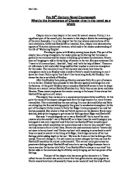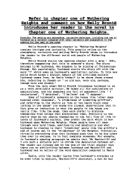Remind yourself of the passage in the middle of chapter 9 of Wuthering Heights from “Nelly do you never dream….” As far as “No I’ll not promise.”(p.57)
Discuss the importance of the passage in relation to your reading of the novel
In your answer you should
- Explain your own view of Cathy at this point in the novel;
- Look closely at the effects of the ways in which she expresses her feelings for Linton and Heathcliff;
- Comment on what the passage suggests about conflict between personal feelings and social expectations, in your reading of the novel as a whole.
In chapter 9, Cathy confides in Nelly, telling her of Edgar’s proposal of marriage. She confesses to having said yes, mainly for the social status attached and because it would be the right thing to do. After much discussion as to whether she has made the right decision or not, Cathy asks Nelly – “Nelly do you ever dream queer dreams?” She recounts a nightmare that she once had, and this upsets Nelly, as she is quite superstitious about them – “I tell you I won’t harken to your dreams, Miss Catherine!” Nightmares have connotations, leading to anxieties, fears, and doubts. What makes the dream quite disturbing is that it was about heaven. Heaven is usually represented as a wondrous place, where people would be content, and happy when they have died. The fact that Catherine admits she would not be happy there gives the nightmare a different, dark side, "I was only going to say that heaven did not seem to be my home…". The idea that anyone could be unhappy in heaven would seem quite bizarre and possibly scary to the reader, particularly the 19th Century audience that would have first read this novel. This description of her dream reveals a fair amount about what she thinks of herself and the entire situation. The way she broke her heart with "weeping to come back to earth" and how the angels were "so angry" that they flung her out "into the middle of the hearth on top of Wuthering Heights…" seems to represent her marriage to Edgar Linton. Heaven is with Edgar, but she recognises that she does not belong with him when she says, "I've no more business to marry Edgar Linton than I have to be in heaven…". She also admits that she does loves Heathcliff, "… how I love him…", but she knows that she cannot not marry him. She understands that she must marry a rich and respected man, which is what Edgar Linton is, and not Heathcliff. This passage also represents the expectations of women in the time the book was written, when social upbringing played a large part in who you were supposed to mixed with.







